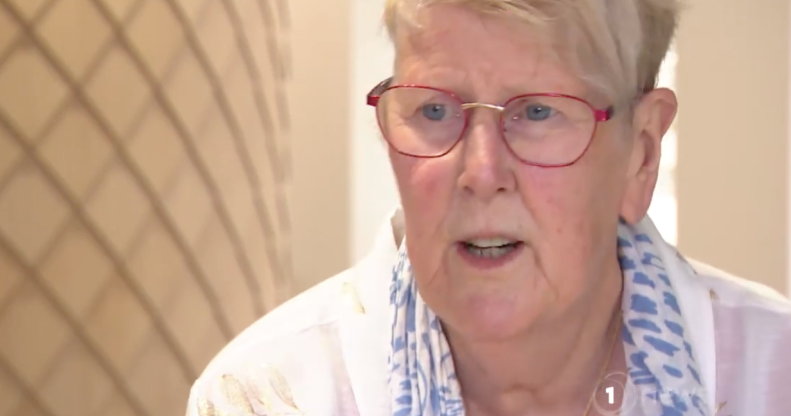Woman given electric shocks to ‘cure’ sexuality calls on government to admit ‘torture’

Joan Bellingham was training to be a nurse when she was admitted to a psychiatric ward for being a lesbian. (1 News)
A woman who was given more than 200 electric shocks – leaving her with severe burns and bouts of blindness – in an attempt to “cure” her sexuality, has called on the New Zealand government to acknowledge the torture inflicted on her and others.
Joan Bellingham has also been left with memory loss as a result of what she calls “torture”, which included being forced to take a cocktail of drugs, while she was in the care of The Princess Margaret Hospital, in Christchurch, between 1970 and 1982.
She made a claim through the Accident Compensation Corporation (ACC) in 1987 for the burns to her scalp, but had to wait 12 years before receiving NZ $10,000 (£4,600/$5970 ) in compensation for the burns and $1,500 (£695/$895) for the resulting chronic headaches.
In 2012, she approached the Crown Health Funding Agency and received a $4,000 (£1,850/$2,390) “wellness payment”, and part of her legal costs, but the settlement had to remain secret and the authorities refused to admit any wrongdoing.
But, speaking to Radio New Zealand, she is now calling on the government to acknowledge the torture carried out under the guise of medical treatment at facilities throughout New Zealand.
‘Horrific pain’
Bellingham’s electroconvulsive therapy (ECT) records have been lost, meaning the extent of what she went through will never be fully revealed. However, some documents which remain detail the hundreds of shocks to which she was subjected.
She claimed to have been shocked more than 200 times, simply for being a lesbian.
“I knew every time I went in there that I was going to experience this horrific pain,” she said.
”Something was injected into me which paralysed me. There’d be someone standing over there with the ECT box, and someone [who] was in recovery [was] moaning and groaning. I knew that was going be me – if I survived it. Each time, I thought I was going to die.
“I can remember the pain, the horrific headaches afterwards, vomiting continuously, going blind sometimes, severe burns to my head, and they’d be seeping. They’d still give me shock treatment again the same day.”
‘Like a death drug’
The pseudoscientific practice of conversion therapy ranges from the electric shocks Bellingham endured to psychoanalysis, aversion treatments, nausea-inducing drugs or simply “praying the gay away”. All forms have been rejected by mainstream medical and mental-health organisations for decades.
Bellingham remembered the “death drug”, leaving her in “horrific pain”. A doctor asked her “many inappropriate sexual questions”, she added.
“If they were doing something to fix someone who was sick it would be a different cup of tea. When I went in there I wasn’t a sick person. They were giving me this indescribable pain, they were taking away my memory, they were taking away my personality, they were making me blind, they burnt my head.
“That’s torture to me.”
She also claimed that one boy who was also going through the “treatment”, later took his own life.
The Director-General of the Ministry of Health, Dr Diana Sarfati, apologised on Tuesday (12 November) to all of those who suffered abuse in state care and healthcare facilities between 1950 and 1999.
In a statement to PinkNews, a Ministry of Health spokesperson said: “The Ministry acknowledges the survivors who shared their experiences with the Royal Commission. The Ministry also acknowledges those survivors who did not, or were no longer able to, participate in the inquiry.
“The Ministry of Health, in particular, acknowledges the harm experienced by individuals in health and mental health services. Any harm, and especially any abuse as result of trust placed in government institutions, is unacceptable.”
Suicide is preventable. Readers who are affected by the issues raised in this story are encouraged to contact Samaritans on 116 123 (www.samaritans.org), or Mind on 0300 123 3393 (www.mind.org.uk). Readers in the US are encouraged to contact the National Suicide Prevention Line on 1-800-273-8255.
Share your thoughts! Let us know in the comments below, and remember to keep the conversation respectful.
How did this story make you feel?

